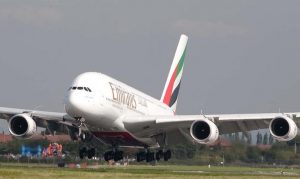
Dubai based Emirates Airline has recently been named as the world’s third largest airline by capacity with 144 aircraft in its fleet. The airline has now overtaking US carrier United and sits only behind Delta and American Airlines.
Emirates will produce 16.9 billion available seat kilometres (ASKs) in March 2011, up 9.9 % year-on-year while United’s capacity is easing 0.6% to just under 16billion ASKs, according to Innovata.
The rise up the capacity charts is due to the Emirate’s decision to use only the world’s largest planes. Emirates already has 15 Airbus A380 superjumbos in its fleet, with a staggering 75 more to come plus 53 stretched Boeing 777-300ER aircraft, with 49 of those still to be delivered from Seattle.
The huge growth in capacity that 75 A380s and 49 777-300ERs will bring are expected to add a further 60,000 seats to Emirates’ capacity without even counting the 70 big Airbus A350s.
Emirates also has a capacity advantage in comparison with other airlines because of Dubai’s strategic geographic location, which acts as a hub for its flights between Australia and Europe, Africa and the Middle East.